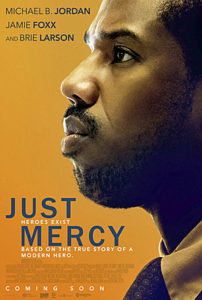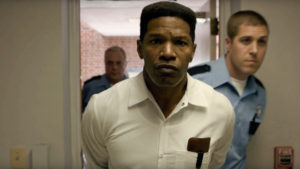 By Steve Crum
By Steve Crum
A legal drama about a vicious killer who has been a scourge for the past six years on death row? No. Just Mercy is based upon a true story about a totally innocent man who was housed on death row before he was even convicted. And found guilty based upon falsified “evidence.” This above average movie deals with racism, a corrupt prison system, and determination. Like other films of this ilk, the audience’s shock, disgust, and anger grow as the story progresses.
Think about other movies focused on a wrongly accused prisoner, and how frustrated we feel as the subject has to undergo harsh treatment strung out over many years. What comes to my mind is 1999’s The Hurricane, starring Denzel Washington as Rubin “The Hurricane” Carter, who spent 20 years in prison after being falsely convicted of murder.
 Just Mercy is all about Walter McMillian (well played by Jamie Foxx), a family man driving home in 1987 rural Alabama who is stopped on the highway by police for murdering a local 18 year-old girl. He is rushed to judgment by essentially a kangaroo court that assumed he was guilty, sans any credible evidence. It is strongly implied that being African-American weighed against him.
Just Mercy is all about Walter McMillian (well played by Jamie Foxx), a family man driving home in 1987 rural Alabama who is stopped on the highway by police for murdering a local 18 year-old girl. He is rushed to judgment by essentially a kangaroo court that assumed he was guilty, sans any credible evidence. It is strongly implied that being African-American weighed against him.
=====
Aside: Is it just coincidence that in movies, seemingly 90% of the time, wrongful treatment of African-Americans occurs in either Alabama or Mississippi? This time it is Alabama burning.
=====
 Discovering McMillian’s plight is novice defense attorney Bryan Stevenson (Michael B. Jordan), who immediately moves for an appeal trial. Aided by local advocate Eva Ansley (Brie Larson), Harvard Law School grad Stevenson butts heads with the local police chief and city attorney. They both played a huge part in sending Stevenson to prison six years earlier.
Discovering McMillian’s plight is novice defense attorney Bryan Stevenson (Michael B. Jordan), who immediately moves for an appeal trial. Aided by local advocate Eva Ansley (Brie Larson), Harvard Law School grad Stevenson butts heads with the local police chief and city attorney. They both played a huge part in sending Stevenson to prison six years earlier.
Jordan and Foxx are impressive actors, but so is Tim Blake Nelson’s sniveling prison lifer, Ralph Myers. It is Myers’ testimony that led to McMillian’s guilty ruling. Incidentally, what a convincing facial contortion Nelson creates.
 Without spoiling major plot twists, rest assured that McMillian does get his second trial in court. But that occurs quite a while before the film’s finale. Enough said.
Without spoiling major plot twists, rest assured that McMillian does get his second trial in court. But that occurs quite a while before the film’s finale. Enough said.
Director/Co-Screenwriter Destin Daniel Cretton’s heartbreaking account of Walter McMillian’s imprisonment is based on Bryan Stevenson’s best selling book, Just Mercy: A Story of Justice and Redemption. Running 136 minutes, Just Mercy is well worth seeing. It is films like this that have helped cause positive change in our country’s court system.
 Mention should be made that the setting of Just Mercy is Monroeville, Alabama. As shown in the movie, Monroeville proudly touts itself as the home of To Kill a Mockingbird author Harper Lee.
Mention should be made that the setting of Just Mercy is Monroeville, Alabama. As shown in the movie, Monroeville proudly touts itself as the home of To Kill a Mockingbird author Harper Lee.
That is the irony, of course, since Lee’s book centers on the trial of Tom Robinson, an African-American wrongly accused (of rape), and sent to an Alabama prison.
=====
GRADE, On A to F Scale: B
